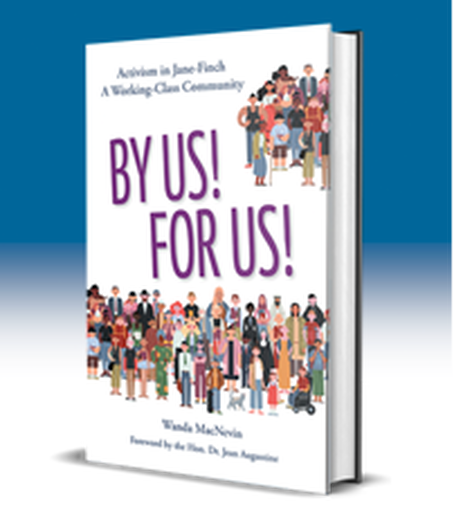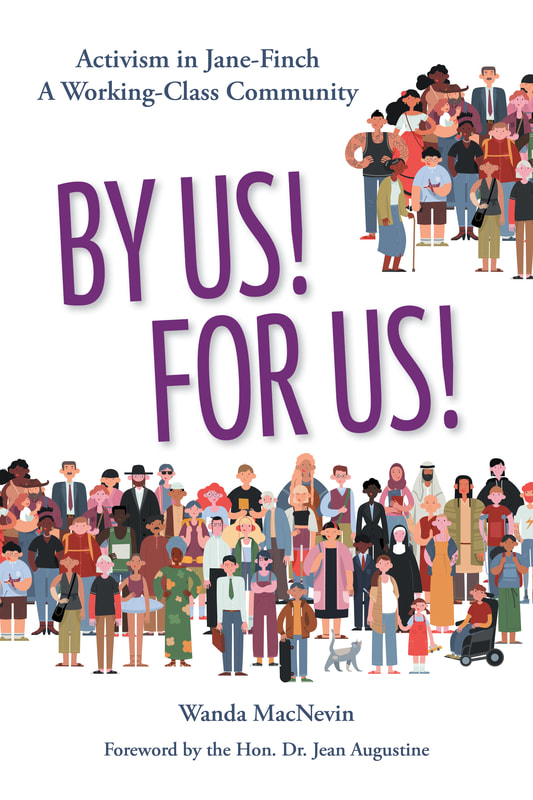|
“The history of many immigrants starts with Jane and Finch. Wanda MacNevin depicts such a clear picture of the struggles this community faced, their determination to bring about changes when barriers created in the education and political system were tough to break. This book is a 'must read' for all immigrants, politicians, and the schools. History of Jane and Finch finally documented!”
—Sunder Singh, Elspeth Heyworth Centre for Women “Ms. MacNevin describes the historical memory of Jane and Finch in Toronto, with passion and intimacy. She writes about how the dynamic style of life of an impoverished community became a light of hope, solidarity and love in a new ‘Ubuntu’, built by immigrants from around the world. Her book is a spark of hope from the voiceless people in one of the most diverse areas in the city.” —Fr. Hernan Astudillo, San Lorenzo Church “Wanda MacNevin’s work should be required material for city planners to consider on the generational effects of concentrated poverty. Despite the challenges she presents, her story is one of hope and a testament to the power of community advocacy in charting an equitable path for a neighbourhood’s future.” —Tom Rakocevic, Lifelong Resident, MPP Humber River-Black Creek |
|
“The book by Wanda MacNevin (By Us! For Us!) is a strongly written social history of the development and growth of the Jane-Finch community. In essence, she has a profound understanding of the impact of social development. The story needs to be told.”
—Ato Seitu, Activist and Professional Artist “MacNevin filters her findings through her own sixty-year experience of living and working in the area and creates a huge contribution to understanding the community. She has produced a chronological text, expansive and dense in detail, that informs readers about the mis-design of the community, which fosters serious problems. Most importantly, she documents the tireless and resilient community reactions that spun bureaucratic straw into neighbourhood gold. She does this so that others can learn from it. MacNevin’s book shines a light on these efforts that are most overlooked, neglected, and unrecognized in many political circles, the media, and the wider Toronto community.” —B. J. Richmond PhD, University of Toronto “This book is a wonderful, well-researched history of the challenges and achievements of the people of the Jane-Finch community told by one of its most recognized members. Wanda MacNevin draws on her own long personal and professional history and her extensive interviews of the Jane-Finch leaders and allies to document the hard work and persistence of the community in the face of constant obstruction by every level of government. It is a story of inspiration and hope and should be required reading for all students at neighbouring York University, particularly those in urban planning, politics, geography, and social work.” —Susan McGrath C. M., York University “The Jane-Finch book gives a comprehensive history of the area, from its being home to various indigenous peoples, to early European settler-farmers, to the current multi-racial population. It documents through stories the determination, creativity, and expertise of residents who created community-based organizations and tapped into nearby resources such as York University to respond to local needs, despite the unwarranted negative picture of the neighbourhood depicted in public media. It highlights the importance of social partnerships, including faith communities, in creating a new future for residents. The book is a testimony to hope in what is usually depicted as a hopeless situation.” —The Honourable Lois M. Wilson, O.C., O. ONT |
"I was really happy to get a copy of Wanda MacNevin’s fine book on the Jane-Finch community. In the mid 1970’s, and then again in the 1980s, I had the opportunity to work with various individuals and groups there. Indeed one of the pleasures was to read the names of so many people I had met, worked with and learned from. In my teaching and writing on community work, I often drew on the memories of some of my experiences there. Now however, we have her book as a concrete resource. I hope the book is used in community work courses so that students can have the opportunity to hear the voices of Wanda and the other members of the Jane-Finch community as they tell the story of their journey and achievements."
― Bill Lee BA, MSW, Ed.D; Associate Professor (retired), School of Social Work, McMaster University
"I think it will be a good resource for present and future staff persons, volunteers and students working in the community. It also empowers residents by showing the resourcefulness and resilience of the community. In a society that is increasingly secular and dismissive or suspicious of Christian programs, it is refreshing to have you portray those of us who were affiliated with the church as valued partners in the efforts to build a healthy community."
— Joanna Reesor-McDowell, Former Community Coordinator, 15 Tobermory Community Ministry
"For community developers in Toronto, resident activism in Jane-Finch since the 1970s is fertile ground for study. In this book, Wanda MacNevin provides the prime resource for such learning. She blends an account of the hard facts of suburban social and economic development with the compelling stories of local resident leaders who persistently demanded a community voice in decisions affecting their community’s well-being. There is so much here to inform community practitioners struggling today with similar forces of resistance to equity and inclusion in urban life."
— Peter Clutterbuck, Former Executive Director, Social Planning Toronto
"BY US! FOR US! is a true recounting of activism that includes acknowledgement of Toronto’s Indigenous population presence in the Jane-Finch area before its suburban, social, and economic transition. As we embark on another transition, driven by climate, technology, and automation BY US! FOR US! offers insights on the importance of an inclusive community-based approach in the face of change."
— Sharon Simpson, Special Projects Coordinator, Labour Community Services
"This is an inspiring book documenting a long history of community persistence, mobilizing and action. Wanda does a great job in foregrounding the agency of residents in all of the swirl of poorly informed planning and policy initiatives through the years. This narrative provides great insight into the elements of community power and capacity-building which will be of interest to all who are working to advance equity and anti-oppression in their local neighbourhoods."
— Rob Howarth, Co-Executive Director, Toronto Neighbourhood Centres
— Joanna Reesor-McDowell, Former Community Coordinator, 15 Tobermory Community Ministry
"For community developers in Toronto, resident activism in Jane-Finch since the 1970s is fertile ground for study. In this book, Wanda MacNevin provides the prime resource for such learning. She blends an account of the hard facts of suburban social and economic development with the compelling stories of local resident leaders who persistently demanded a community voice in decisions affecting their community’s well-being. There is so much here to inform community practitioners struggling today with similar forces of resistance to equity and inclusion in urban life."
— Peter Clutterbuck, Former Executive Director, Social Planning Toronto
"BY US! FOR US! is a true recounting of activism that includes acknowledgement of Toronto’s Indigenous population presence in the Jane-Finch area before its suburban, social, and economic transition. As we embark on another transition, driven by climate, technology, and automation BY US! FOR US! offers insights on the importance of an inclusive community-based approach in the face of change."
— Sharon Simpson, Special Projects Coordinator, Labour Community Services
"This is an inspiring book documenting a long history of community persistence, mobilizing and action. Wanda does a great job in foregrounding the agency of residents in all of the swirl of poorly informed planning and policy initiatives through the years. This narrative provides great insight into the elements of community power and capacity-building which will be of interest to all who are working to advance equity and anti-oppression in their local neighbourhoods."
— Rob Howarth, Co-Executive Director, Toronto Neighbourhood Centres


